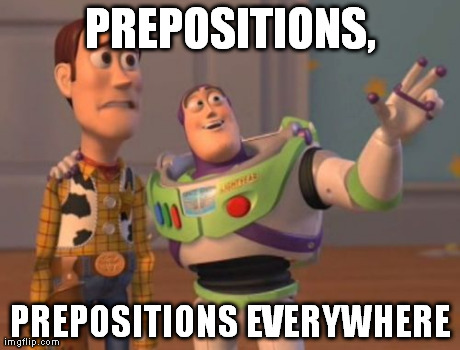How to make less mistakes in English. Explains a native speaker

In linguistics, there is such a thing as interference - the influence of the native language on the one we are studying. Most often these are attempts to find some common features in phonetics, grammar and vocabulary in the native and foreign languages.
At the initial stage, it helps to understand the phonetics, but then you have to get used to a large number of rules and exceptions that have no analogues in Russian.
We asked one of the most experienced native speakers of English in our school, Tress, to tell about the most frequent mistakes of her Russian-speaking students and how to correct them. But before proceeding to the list itself, there are a number of tips from it, so that the number of errors constantly decreases:
')
- always write an unfamiliar word in a file, application or notebook to make fewer errors in spelling;
- practice communicating as often as possible so as not to be afraid of your pronunciation in English and make less mistakes in phonetics;
- Do not be afraid to ask again and clarify when communicating - you will understand quickly, even from the fifth time, and you will be able to make fewer lexical mistakes;
- for the same purpose, it is worth reading more in English to better remember the meanings of words;
- Try to listen and watch audio and video in English more often (it is better to have short sessions of 3-5 minutes first) to make fewer mistakes when recognizing speech by ear.
And now the list of private errors and solutions to prevent them.
On time vs In time

On time - punctual, not late. If something happens, it was planned. The opposite for the phrase is “late”.
That is, in accordance with the planned time, not too late. To avoid mistakes when using this phrase, remember the antonym - late.
The 11.45 train left on time. - The train at 11.45 left on time.
In time - for something. The phrase for the phrase is “too late”.
This can also be translated as “on time” and soon enough. Only in this case, the landmark is not for a specific time, but it’s time to do something, do something. To remember the meaning correctly, we use the antonym “too late”.
Will you be home in time for dinner? - Do you have time to go home for dinner? (specific time is not indicated).
At the end, at the end, at this end
At the end of the moment.
“At the end” (at the end, at the final stage) should be used to tell about the event at the very end. After this phrase there is always a clarification and the preposition “of” (at the end of which it is).
At the end of the meeting, they shook hands. - At the end of the meeting, they shook hands.
It is not a single event.
This construction (in the end - as a result, as a result) is used to tell about the final result or the result, and not about a separate event. In order not to be confused with “at the end”, look at the general context and whether there is a clarification, at the end what it is. If not, use “in the end”. If there is - “at the end”.
In the end, no one will miss you. - In the end, no one will miss you.
This is a previously used goal.
There is also such a construction, which is often incorrectly translated. It means “for this purpose” and is not connected with the end. In order not to make mistakes when translating into your native language, always pay attention to the preposition “to” at the beginning of a phrase.
This is a meeting. - He wanted to discuss his idea and organize a meeting with this goal.
In the school, at the school, in the school, at school
In the school - under the roof of the school building.
This can be safely translated as “under the roof of the school” if we are talking about a person or subject. That is, right in the building. To use the phrase correctly, notice the presence of “the” in the phrase. This will mean location.
The books are in the school now. - Books are now in the school building.
At the school - in or near the school building.
It should be taken as “on school grounds” or directly at school (you can also talk about a person or a subject). There is also “the” here, so the emphasis is more on location, but not quite accurate (inside the school or on its territory).
Where is your friend? - Somewhere at the school. - Where is your friend? - Somewhere on the school grounds.
In school - being educated in or at a school; occupied with being educated (said of a person).
This can be said only about a person who is currently studying, and in any educational institution (institute or university, and so on). In order not to be confused with “in the school”, remember that the emphasis is more on the learning process itself, and not on the location.
What is she busy with now? - She is in school. - What is she doing now? - Learning.
At school - located at a school; attending a class in a school (said of a person).
We also use this phrase only about a person, indicating that he is in the school, attends classes. In this case, we are talking only about the school, and not schools in general.
Can't come to your place now, I am at school. - I can not come to you now, I'm in the classroom.
You can say that there is an auditorium in the school, but the auditorium is not in school or at school.
So our carrier explains that inanimate objects can only be in the phrases “at” or “in” with the article (in the school and at the school).
In general, it was associated with X: at school, at work, at court, at football practice.
In general, if we say at something there, we indicate participation in something: at school, at work, in court, at a football training session.
Sentences that end with a preposition

It is a rule that the sentence goes to the Latin grammar.
This rule often leads to unnatural-sounding sentences.
In the 18th century, some of the English grammar specialists thought that one should not end sentences with pretexts, being guided by the rules of Latin grammar.
But if the prepositions do not put in the end of the sentence, they may sound unnatural.
We were the most concerned. - It was about our mother that we were most worried about (the excuse about in the middle of a sentence is harder to pronounce).
It was my mother. - It was about our mother that we were most worried about then (the preposition about at the end of the sentence is easier to pronounce).
Based on this, the native speaker says that the choice is ours (whether to put an excuse in the end):
The question is whether it is not a matter of taste.
Who and whom

It is exactly the same.
The difference here is the same as between I and me, he and him, she and her, and so on.
He, he, and she, he is the subject of the person.
Who, like I, he and she, act as the subject, the person who performs the action expressed by the verb.
What is the action?
Whom, like me, him and her - addition, the person with whom the action takes place.
Who is talking to you? - Who is talking to you? (who - subject)
Whom are you talking to? - Who are you talking to? (whom - addition)
It is also worth noting that now “who” is also more often used as a supplement. In order to avoid mistakes and understand that we are subject or predicate, pay attention to the word order in the sentence:
Who is talking to you? - the word order after “Who” in the role of the subject line, as in the affirmative sentence.
Who are you talking to? - after the word “Who” there is a full-fledged interrogative word order.
Substitute who with the word he. If you’re part of the sentence
There is another way to distinguish the value of who - replace with he. If after this the sentence has not lost its meaning, then who is in his place and plays the role of the subject.
Who is talking to you? - He is talking to you. - It sounds clear, it means who acts as a subject.
Who are you talking to? - He are you talking to. - The sentence is perceived as incorrect and “he” cannot replace “who”. So “who” acts as a supplement.
English nouns as adjectives
Adjectives don't have plural forms. Ever. But nouns are common to modify other nouns. Instead, I would say these are attributive nouns.
In English, adjectives do not have a plural. At all. But nouns can become adjectives to expand or change the meaning of other nouns. They become like noun definitions.
It turns out that noun-definitions follow the same rules as English adjectives. Therefore, nouns in combinations, like the five-minute walk and others, do not change their number (we do not say five-minutes walk).
We hope that these tips will be useful and will help to make your English speech more correct. We plan to talk about other mistakes that are often committed by Russian-speaking students of our teachers, carriers. And what moments in English often raise questions for you? We will be glad to know in the comments, so that later our native speaker will help us answer your questions.
Reader Bonuses
Online Courses
We give free access to three months of learning English through our online courses. To do this, simply follow the link until December 31, 2017.
Individually by Skype
We will be glad to see you in English courses for IT-specialists.
Sign up for an introductory lesson and get comprehensive feedback on your level of knowledge, then choose a teacher and an educational program for yourself!
Source: https://habr.com/ru/post/370955/
All Articles